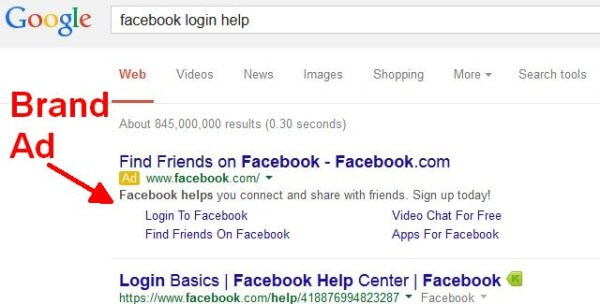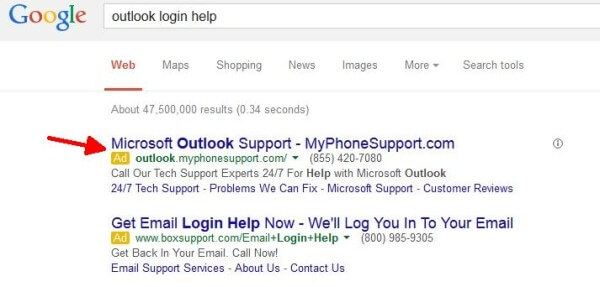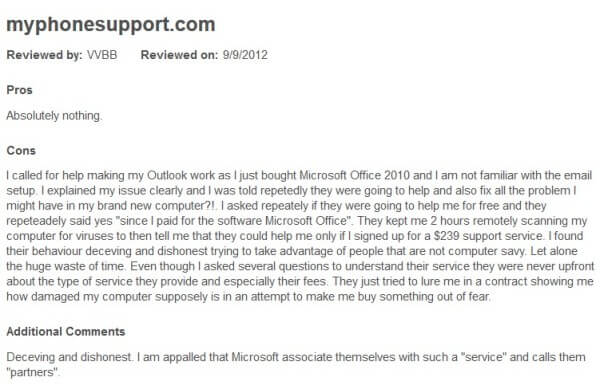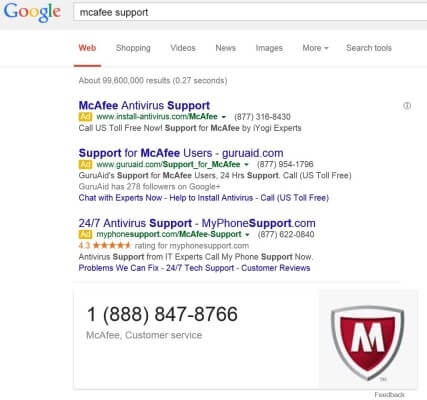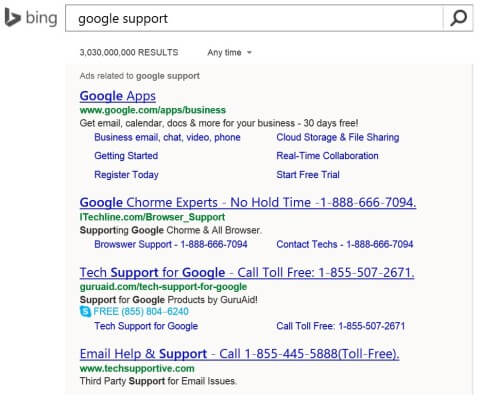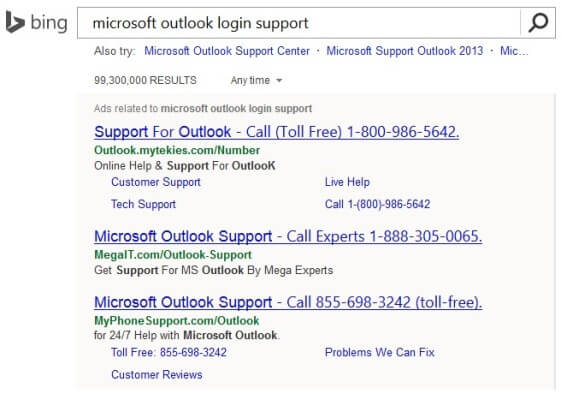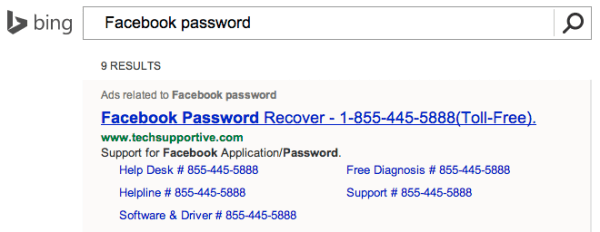Despite Crackdowns, Tech Support Ads In Search Are Still Cause For Consumer Confusion
Just last month, six international tech support scam operators were ordered to pay more than $5.1 million as a result of charges filed by the Federal Trade Commission in 2012. The scammers typically posed as representatives of major technology companies, convinced consumers that their computers were loaded with viruses and got them to fork over […]
Just last month, six international tech support scam operators were ordered to pay more than $5.1 million as a result of charges filed by the Federal Trade Commission in 2012. The scammers typically posed as representatives of major technology companies, convinced consumers that their computers were loaded with viruses and got them to fork over large sums of money to fix what wasn’t broken.
One tactic used by the operators was to run paid search ads on computer branded support queries– such as “Microsoft support.” The FTC said at the time,
“the scammers hoped to avoid detection by consumers and law enforcers by using virtual offices that were actually just mail-forwarding facilities, and by using 80 different domain names and 130 different phone numbers.”
The practice of using different domains and subdomains with branded trademarks in search ad display was widespread last summer when Search Engine Land reported on the state of tech support advertising on Google. Advertisers still use phone numbers as the primary call-to-action in the ads. Taking transactions offline makes it harder for the search engines to account for the user experience and determine whether an ad should be disabled. It’s also easier to scare consumers into thinking their computers are overrun with viruses in a phone conversation.
Below is an example of ads for “Google support” spotted last August. Notice the use of the “Google” and “Gmail” in the subdomains to skirt trademark policies.

Then: Tech support ads using trademarks and promoting login and password recovery help were ubiquitous.
This spring, AOL, Facebook, Google, Twitter and Yahoo announced the formation of a consortium called TrustInAds.org aimed at exposing and educating lawmakers and the public about malicious advertising. The group’s first Bad Ads Trend Report focused on tech support advertising scams. Facebook and Google said they took down over 4,000 suspicious advertiser accounts links to more than 2,400 tech support websites.
The results today on Google are markedly improved from a year ago. Yet there are often discrepancies in when ads for tech support companies appear in the search results. These companies get away with much more on Bing.
Here’s a look at what consumers can expect to find today when searching for tech support online.
Today, Branded Tech Support Results Are Not Consistent
Though I’ve been told the fact that Google results on brand related queries for tech companies outside the TrustInAds.org consortium is not intentional, the differences are often striking.
Today, it’s rare to see any ads appearing on Google for the phrases “Facebook login help,” “Facebook support,” “Gmail login support” or “Google support.” For Google-related queries, the search engine often displays a Quick Answer with the direct customer service phone number at the top of the page.
Most Facebook support queries yielded no ads, on occasion a Facebook brand ad displayed.
In contrast, many other tech companies continue to have their trademark terms used or squatted on by support advertisers.
Ads On Microsoft And McAfee Queries
While search results on “Gmail login support” and “Yahoo mail login support,” for example, are typically ad-free, results for queries on Microsoft products are almost always shown with ads.
Below is a result for “Hotmail login support,” surfaced by brand monitoring firm BrandVerity. Both ads promise login help. The first ad has grammatical errors: “Call Toll Free & Get Fix Hotmail Login & Password Problems By Expert.”
A search for “Outlook login help” also yields ads. The first ad from myPhoneSupport uses “Microsoft Outlook” in the ad headline, display URL and ad copy. In this case, the company is a Microsoft partner and presumably has permission to use the trademarks in its ad copy.
The second advertiser, Box Support, is not a certified Microsoft partner and is not using the trademarks in its ad copy.
On the Microsoft partner site, there is just one user review for MyPhoneSupport.com, but the complaint echoes problems surfaced in the FTC’s case: “They kept me 2 hours remotely scanning my computer for viruses…”.
On recent searches for “McAfee support” and “McAfee Support”, Google is now displaying the customer support numbers for each company in a Quick Answer box. Here though, it appears below ads from support companies often using the trademarks in ad headlines, copy and/or display URLs.
Again, these advertisers are often partners or affiliates and may have permission to use the Microsoft and McAfee trademarks. Or maybe these companies just aren’t as stringent about enforcing trademark usage in search. The tech support companies advertising on these terms – iYogi, MyPhoneSupport.com, FixNow.us, Guruaid.com – are major players in this sector and the most active advertisers.
Still, it’s easy to see how consumers could be confused and think that the website Microsoft.Myphonesupport.com is Microsoft’s actual customer service help site, for example.
Bing Is Much Less Restrictive
In nearly every tech support search, Microsoft-owned Bing displayed ads — regardless of the tech company being queried. On a search for “Google support,” we saw an ad from ITechline.com promoting support for “Google Chorme [sic]”.
Ads display on queries for Microsoft’s own terms, such as “Microsoft login support” and “Microsoft Outlook login support,” as shown below.
What’s particularly striking on Bing is the number of ads that are loaded up with sitelinks repeating the same phone number. In this ad below on a search for “Facebook password,” spotted by BrandVerity, Techsupportive.com is promoting help for “Facebook password recover” and “Support for Facebook Application/Password.” The phone number is repeated in the ad copy and every sitelink.
This next set of ads were found running on a search for “Apple support” last week. Again, these advertisers are abusing the sitelinks by stuffing them with the same phone number. And none of these advertisers are using call extensions, which allows click activity to be tracked. (Guruaid was the only advertiser I saw using actual call extensions on Bing, though the company also puts phone numbers in the ad copy and sitelinks.)
BrandVerity also found odd things happening in customer support ads on Bing in sectors outside of tech.
Work To Be Done
Many of these tech companies offer legitimate tech support and consumers should be able to find these types of services. (Though ads promoting login and password recovery help using company trademarks are particularly concerning.) Where the issue becomes gray is on branded terms. You can see how easy it is for consumers to mistake many of these ads as coming from the tech companies themselves. The matter is further confused when some brand query results are shown with ads and others almost never are.
In a sector pocked by bad actors, the tech brand companies themselves as well as the search engines should take greater steps to enforce trademark usage. The search engines should adopt greater consistency in when and how ads are displayed on branded tech support queries.
Update: BrandVerity’s Sam Engel has written a follow-up post that I recommend that digs into ads promoting “official” customer service numbers on branded queries like those in the Lego and Newegg examples above. Engel found these so-called connection service ads showing on Google as well. Consumers who connect to a brand via these ads can end up paying exorbitant rates for what could have been a toll-free call.
Contributing authors are invited to create content for Search Engine Land and are chosen for their expertise and contribution to the search community. Our contributors work under the oversight of the editorial staff and contributions are checked for quality and relevance to our readers. The opinions they express are their own.
Related stories
New on Search Engine Land


